|
![LINKAGES [logo]](/cites/CITA2/./assets/images/top_banner_1_.jpg) |
|
 |
 |
 |
 |
 |
 |
 |
 |
 |
 |
 |
 |
 |
 |
 |
 |
 |
 |
 |
 |
 |
 |
 |
 |
 |
 |
 |
 |
|
Daily Web Coverage: Monday Tuesday Wednesday Thursday Friday
|
|
|
|
 |
|
Eighteenth Meeting of the Animals Committee
|
|
|
|
|
|
San José, Costa Rica, 8-12 April 2002
|
|
|
|
|
|
|
|
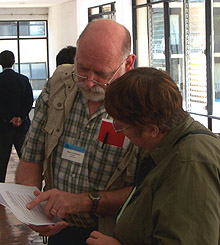 |
|
Friday, 12 April
Captive Breeding:
The Chair of the working group on captive breeding presented their report, outlining conclusions and recommendations. China maintained that the report should not go to COP-12 because it was agreed to by the majority of participants and not by consensus. Responding to this concern, Israel said that although the conclusions and recommendations were not reached by consensus, the efforts of the group did further elucidate the issues. IWMC-CH enquired about the procedure to register captive breeding facilities, and Chair Hoogmoed pointed out that the group had agreed on using procedures set out in Resolution Conf. 8.15 (Rev.). Delegates adopted the report
 Listen
to the report from the Working group
Listen
to the report from the Working group
|
|
|
|
|
|
|
|
|
|
|
|
|
|
Chair
Hoogmoed
|
|
|
|
Hard corals:
The Chair of the working group on hard corals introduced the group's report, as well as a report on coral production systems, drafted jointly with the US. He said future references should be to "stony" corals. Oceania requested that the coral production systems issue be further explored. The Secretariat said a recommendation would be made at COP-12 to keep trade in stony corals on the agenda. The US expressed concern with the definition given for fossilized corals, stating that the current formulation might affect the status of related CITES species. Belgium enquired about new identification guides to be produced, and the US said work is ongoing. Delegates adopted the report
 Listen
to the report from the Working group
Listen
to the report from the Working group
|
|
|
|
|
 |
|
|
|
|
|
|
Review of Appendices/Animal Taxa:
The working group Chair presented the report, highlighting that intersessional work will be conducted on the process of future reviews and stressing that the guidelines will not be sent to COP-12 or codified in any resolution. Responding to a query from the Netherlands on placement of text in the guidelines regarding new threats to species, the US said the issue would be taken up in the intersessional group. The IUCN offered assistance in future preparation of reviews once the guidelines are approved. IWMC-CH asked if the US – as depository of the Cnemidophorus hyperythus review – would submit a proposal on its delisting, to which the US responded affirmatively. The Committee adopted the report
|
|
|
|
|
Peter Linhart, Austria
|
|
|
|
|
|
|
Review of Resolution Conf. 8.9 (Rev.):
The working group Chair presented the report, stating that the group had reached consensus on all matters. China expressed concern with a paragraph on reviewing recommendations for trade suspensions that have been in place over two years, preferring more encouraging, rather than punishing, language. The Secretariat agreed to revise the language to take into account China's concerns. Israel, supported by India and the Humane Society of the US, objected to reference to adaptive management procedures, which are not defined within CITES. Safari Club International explained that work on these procedures is being done in the CBD. The Humane Society of the US queried the identical timeframes for implementation of actions on species of urgent concern and species of possible concern, and the working group Chair said there was flexibility as to the type of action recommended. Agreeing that the report's version of the revised Resolution would be kept for the Plants Committee to discuss, delegates adopted the report
|
|
|
 |
|
|
|
|
|
|
Tortoises
and Freshwater Turtles:
The
group's Chair reported that it considered the review of significant
trade sheets for five species, recommending: Cuora ambionensis for category
1; Cuora flavomarginata for Category 2 for China and Category 3 for
Japan; Cuora galbinifrons for Category 2; Lissemys punctata for Category
2; and Pyxis planicauda for Category 1, considering the political situation
in Madagascar and the proposed moratorium on all wildlife exports. Incorporating
the results of the Kunming workshop, the working group proposed revision
of Resolution Conf. 11.9 to reflect, inter alia: consensus of States
to include all tortoises and freshwater turtles in trade on the Appendices;
the need to strengthen regional cooperation for management and enforcement;
and further development of action plans. India stressed its intention
to propose all species of Kachuga for Appendix II. The document was
adopted
 Listen
to Questions and Answers from the Working Group's report
Listen
to Questions and Answers from the Working Group's report
|
|
|
|
|
Kurt Nielsen, Denmark
|
|
|
|
|
|
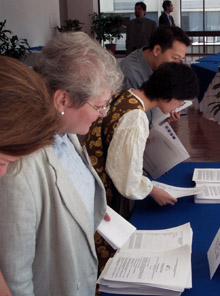 |
|
|
|
|
|
|
Syngnathidae:
The Chair of the working group on Syngnathidae reported on possible species listing proposals and on activities in preparation for the Syngnathidae workshop to be held in May 2002 in the Philippines. The working group report was adopted
|
|
|
|
|
|
|
|
|
|
|
|
|
Animal Transport:
The animal transport working group Chair presented their report, noting that although the group had made good progress, it had not completed all assigned work. She also noted that a subgroup was formed to submit advice to IATA on Container Requirement 45. The report was adopted
 Listen
to the report from the Working group
Listen
to the report from the Working group
|
|
|
|
|
Document collection
|
|
|
|
|
|
|
Significant Trade in Species:
The group's Chair reported on the working group's consideration of species in the significant trade review process, making the following recommendations:
*Acipenser oxyrinchus, the US population in Category 3,
the Canadian population in Category 2 until Canada provides documentation
about discrepancies in trade data, based upon which it may be placed
in Category 3;
*Acipenser persicus species in Iran in Category 3, species
in Azerbaijan in Category 2; *Acipenser transmontanus in Category 3;
*Scaphirhynchus platorynchus in Category 3;
*Moschus fuscus, M. berezovskii, and M. chrysogaster were
all recommended for Category 1; and
*Naja naja in Singapore in Category 2; in Indonesia in
Category 2; in Malaysia, Thailand, and Lao in Category 1; and in China
in
Category 1 until written documentation on the trade ban is provided at which point it would be moved to Category 3.
The group decided that management authorities in countries with Category 1 species should not issue export permits until they have established quotas, and requested the Secretariat to write Singapore to provide information on how they control and manage trans-shipment issues. The document was adopted
|
|
|
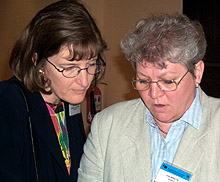 |
|
|
|
|
|
Kristin Vehrs (left), American Zoo and Aquarium Association with Irina Sprotte, Germany
|
|
|
|
|
|
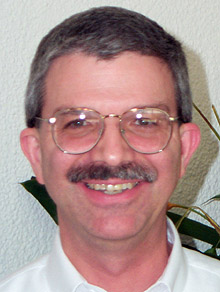 |
|
|
|
|
|
|
Universal Labeling of Caviar/Conservation of Sturgeon:
The group's Chair noted their consensus report calling for, inter alia: adoption of a uniform labeling system for exports to include re-export to cover domestic trade; recognition of population structure and genetic stocks to assist with genetic typing to aid enforcement; contacting the FAO for assistance with long-term management of sturgeon stocks; and consideration of socioeconomic aspects of sturgeon trade. The US stated it is unable to support provisions on the labeling of caviar for domestic trade. The document was adopted
 Listen
to the report from the Working group
Listen
to the report from the Working group
|
|
|
|
|
|
Biological and Trade Status Sharks:
A representative of the IUCN Shark Specialist Group presented on the meeting of the working group, noting one delegation's statement of intention not to join any consensus points. Remarking on minimal progress with IPOA, despite significant trade activity, the group called for strengthening CITES' assistance to Parties in implementing national shark management plans. Noting some species qualify for uplisting, the group called for CITES to prioritize shark fisheries management and to include sharks as an agenda item at COP-12. The group expressed consensus on the need to, inter alia: raise concerns with FAO over lack of implementation of the IPOA; and continue activities beyond COP-12. The document was adopted
|
|
|
|
|
Kurt Johnson, North America
|
|
|
|
|
|
 |
|
|
|
|
|
|
Relationship Between Ex Situ Production and In Situ Conservation:
Chair Hoogmoed noted the work of a small contact group on the relationship between ex situ production and in situ conservation, and outlined plans for continued consideration of the issue. Delegates discussed conduct of this group, future participation, and raised the issue of tracking origins of founder stock in ex situ breeding operations. The Chair supported North America and Oceania's offer to continue intersessional consideration of the subject, and suggested that delegations submit comments in response to the Secretariat's past notification on the topic. The document was noted as the basis for further consideration by members of the Animals Committee
|
|
|
|
|
|
Stating that this was his last Animals Committee meeting as Chair and as Europe regional representative, Chair Hoogmoed thanked everyone for their support and commended delegates for their contributions and the Rapporteur and the Secretariat for their help. The US, with Chair Hoogmoed and the Secretariat, thanked the government of Costa Rica for their hospitality. Oceania thanked Chair Hoogmoed for his work. Tanzania announced that it wishes to host the next Animals Committee meeting. Chair Hoogmoed closed the meeting at 1:10 pm
|
|
|
|
|
Chang-Man Won, Korea
|
|
|
|
|
 Listen
to the report from Central and South America including the Caribbean
Listen
to the report from Central and South America including the Caribbean
 Listen
to the report from the African Region
Listen
to the report from the African Region
|
|
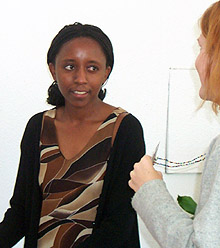 |
|
 |
|
|
|
|
Elly Hamunyela, Namibia
|
|
|
|
|
|
|
Sebastian Troëng, Caribbean Conservation Corporation
|
|
|
|
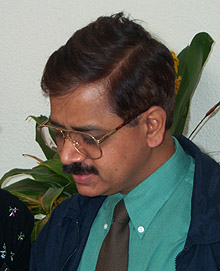 |
|
|
|
 |
|
|
|
|
Rajesh Gopal, India
|
|
|
|
|
|
|
Paula Henry, Scientific Support Unit, CITES Secretariat
|
|
|
|
 |
|
|
|
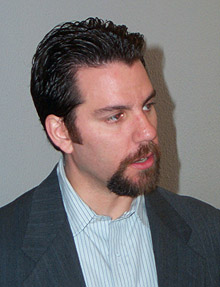 |
|
|
|
|
Ann Michels, Species Survival Network
|
|
|
|
|
|
|
Adam Roberts, Animal Welfare Institute
|
|
|
|
|
|
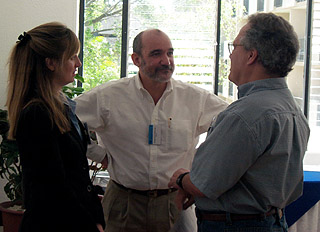 |
|
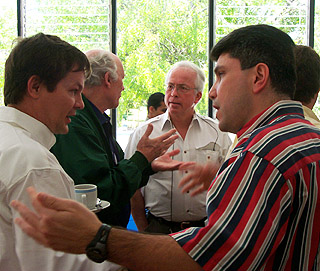 |
|
|
|
|
|
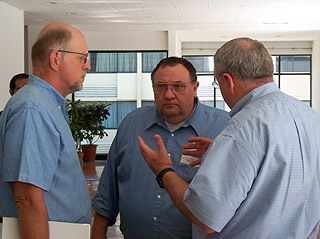 |
|
|
|
From left to right: Malan Lindeque, Chief, Scientific Support Unit, CITES Secretariat, Jacques Berney, IWMC, John Jackson, Conservation Force and Javier Alvarez, USA
|
|
|
|
|
|
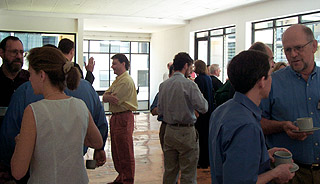 |
|
|
|
|
Charles Pils (left), Midwest Association of Fish and Wildlife Agencies, Wayne Regelin, Western Association of Fish and Wildlife Agencies and Donald Maclauchlan, International Association of Fish and Wildlife Agencies
|
|
|
|
|
|
|
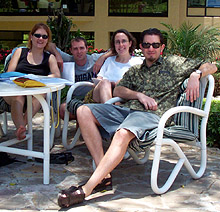 |
|
The
Earth Negotiations Bulletin CITES team
From Left to Right: Wendy Jackson, Mark Schulman, Alison Ormsby and David Fernau
|
|
|
|
|
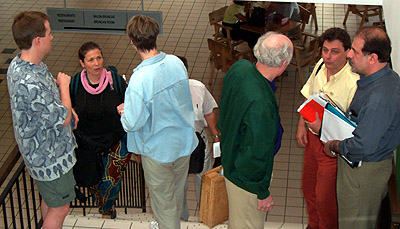 |
|
|
|
|
|
|
![LINKAGES [logo]](/cites/CITA2/./assets/images/top_banner_1_.jpg)



















